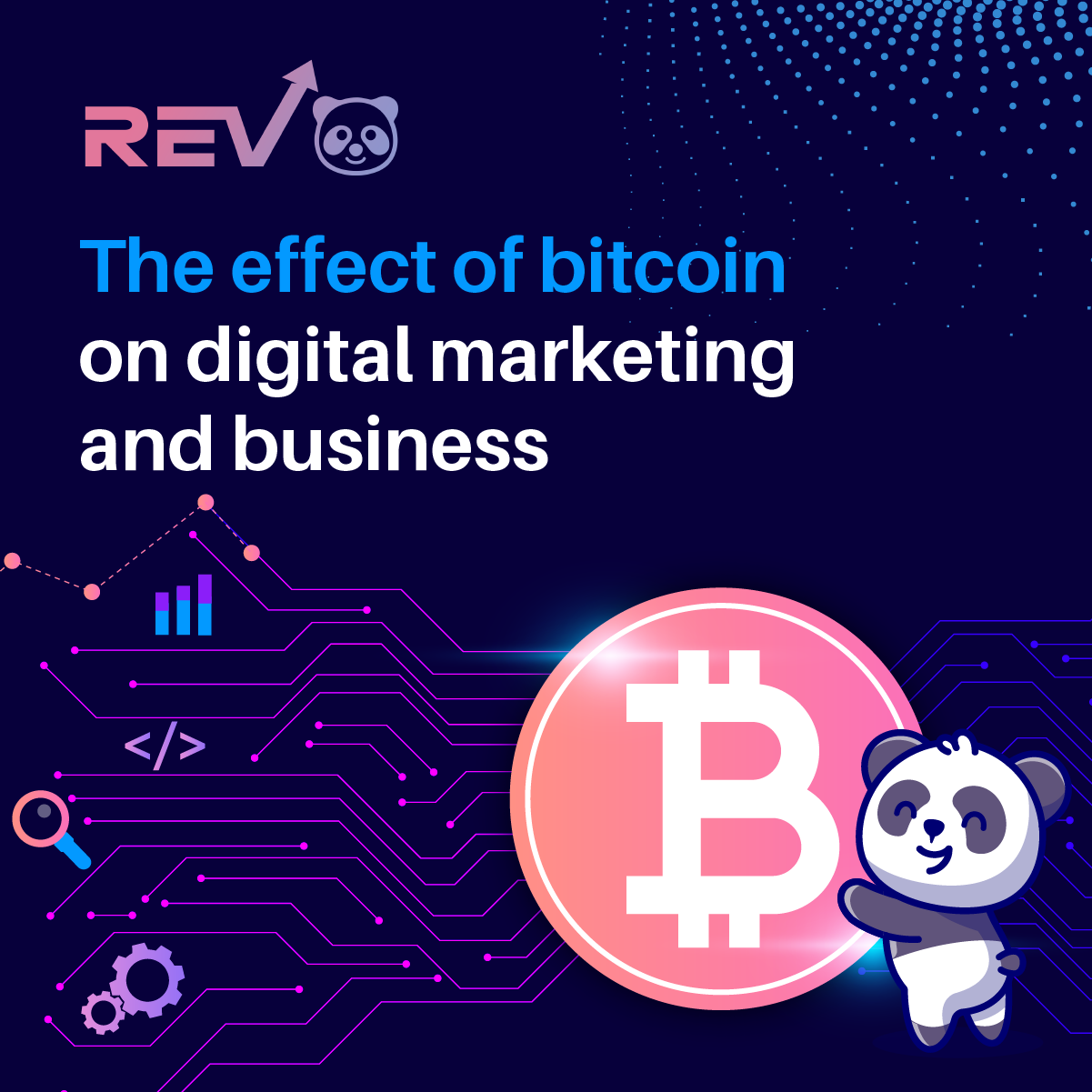
BLOG
Exploring the Influence of Bitcoin on Digital Marketing
Table of contents
Click on a title to jump to a section

In recent decades, technological advancements have empowered digital marketers to gather precise consumer data for targeted advertising. Since information is now considered the new currency in the digital world, its application in marketing is evident through cookies, which track user behavior. However, today's consumers are increasingly aware of how their personal data is collected and used, making privacy a significant concern, particularly among younger audiences. advertisers value big data Given the rapidly evolving technological landscape and changes in the global economic environment, alternative currencies like cryptocurrencies are gaining swift popularity. Bitcoin initiated this transformation in 2009, and its effects have been far-reaching ever since.
Various sectors such as finance, investment, and healthcare are currently utilizing cryptocurrencies. The influence of digital currencies on digital marketing and eCommerce is substantial. Blockchain technology removes the need for intermediaries, thereby reducing costs, a benefit seen even in international transactions, as blockchain ignores national borders.
Understanding the Role of Cryptocurrencies in Digital Marketing
To grasp Bitcoin's impact on digital marketing, we must first understand the current state of the industry. Take YouTube, for instance, involving four key stakeholder groups.
The process is straightforward: advertisers pay a fee to access the audience through the channel. However, it's not just the creators benefiting financially, as YouTube charges significantly for ad space, making them the highest earners.
- The audience
- The publisher or channel
- The advertisers
- The platform itself
If blockchain technology is incorporated, the distribution of revenue could be more balanced between the platform and creators. A decentralized system would give more power back to the consumers—in this case, the channel itself. There are many other examples of how blockchain is utilized in different corners of the digital marketing space.
Who Stands to Gain the Most from Bitcoin's Rising Fame?
Should blockchain become a part of digital marketing, direct access to customer data for advertisers would be eliminated. Instead, they need to pay for consumer consent and ensure that the user experience matches what the customer anticipates. Currently, responsible marketers voluntarily adhere to ethical practices, but blockchain could deal more effectively with unethical players.

Marketers
From the consumers' viewpoint, display ads are sometimes privacy invasions or simply annoying. Blockchain could mitigate this experience. Platforms like Ethereum use Basic Attention Tokens (BAT), which is a form of blockchain-based digital advertising currency. It executes non-intrusive ad exchanges between advertisers, publishers, and consumers, efficiently monetizing user interest and improving resource use. Since users are compensated for their attention, advertisers enjoy a higher return on investment, with publishers receiving a fairer portion of the revenue.

Consumers
Advertisers can use BATs to obtain advertising spaces, such as landing pages or push notifications. Users then have the choice of whether to view specific content, earning BATs for their time if they do. Importantly, this keeps user preferences anonymous, putting the power over ad exposure into their hands.

Advertisers
Publishers, the crucial part of the equation, will receive a larger portion of the profits because both the advertisers and consumers will be paying for the content. Blockchain allows publishers to set premium prices for their content, with interested users subscribing using BAT.

Publishers
This process may be more effective than current practices, as it gives more control back to users and publishers. So why isn't it widely used today? The answer is simple: major platforms will lose substantial profits, an outcome they are not keen to bring about. While blockchain is likely the future of digital marketing, universal adoption remains on the distant horizon.
The Influence of Bitcoin on Digital Marketing
Considering the ongoing developments around us, it's worth pondering how cryptocurrencies might alter digital marketing. By examining available data, it's clear that several factors shape the conception and optimization of ad campaigns. User data sparks the process as it lays the foundation for constructing effective advertisements.
With blockchain and cryptocurrencies entering the picture, consumers would wield more authority in the marketing process, potentially constraining ad visibility. Suppose a Facebook campaign targets a specific demographic, yet while advertisers believe their offering is appealing, recipients may not feel the same.
Imagine a campaign that targets 200,000 individuals. If 2% make a purchase, the advertiser achieves 2,000 sales. However, if the audience outright declines to view ads, this throws a wrench into marketers' strategies, highlighting their hesitation to fully embrace blockchain technology.
The Advantages of Integrating Bitcoin in Digital Marketing
Incorporating Bitcoin and blockchain technology could make digital marketing significantly more competitive than what we experience today. Yet, there are numerous advantages worth discussing. We will explore the top five benefits of utilizing Bitcoin in digital marketing.
Annually, businesses invest heavily in digital marketing. By leveraging cryptocurrency, they can reduce costs as there is no need to purchase leads. Through BAT, user data is efficiently collected. Given that cryptocurrency doesn't hold financial details, merchants must obtain explicit consent from consumers, thereby shifting power back towards the customers.
Optimum Resource Utilisation
Data has become equivalent to gold in today's internet age. Companies such as Google, Facebook, and Twitter share your information with marketers and advertisers freely. Although this doesn't constitute a breach of security, it does concern privacy. Cryptocurrencies, in contrast, protect user data, offering complete anonymity.
Greater Privacy
Cryptocurrencies eliminate the dependency on payment gateways, reducing both fees and transaction times. For example, on platforms like Amazon, purchasing requires a connection through credit cards, bank transfers, or other intermediaries, each time passing through a third-party gateway. Cryptocurrency wallets reflect similar capabilities without the associated complexity and costs, making them an optimal choice for swift transactions.
Eliminating the Middleman
The occurrence of scams is rampant today, with little authorities can do against deceitful actors. From counterfeit followers to fake testimonials, building a deceptive brand identity is simple. Utilizing blockchain can help businesses see whether their investments are truly reaching the intended audience, thus amplifying marketing efficiencies.
Avoid Fake Promotions
Smaller businesses often encounter challenges in outpacing larger, established corporations. Blockchain remedies this by elevating quality over brand size. Thus, authentic smaller companies stand a chance of gaining popularity over larger entities selling inferior goods.
Build Trust
Interplay Between Social Media and Cryptocurrencies
The influence of social media on cryptocurrencies is profound and undeniable. When cryptocurrency gains traction on these platforms, public scrutiny intensifies, altering its perceived market value and sparking price fluctuations.
The relationship between social media and cryptocurrencies For example, when news of the hack on Bitfinex, a major crypto exchange, spread on social media, the value of Bitcoin saw an immediate 20% drop. Conversely, the market reacts positively to supportive statements from figures like Elon Musk, driving Bitcoin prices upwards overnight. The key difference between the cryptocurrency market and traditional stock markets is the absence of state regulations governing the former.
Projecting Bitcoin's Role in Future Digital Marketing
With peer-to-peer technologies gaining traction, marketers might soon need to solicit data directly from consumers. Paying users for their information could become commonplace, raising marketing costs. This model would significantly impact social media heavyweights like Instagram and Facebook, which demand a premium for advertising spaces.
By directly compensating users for their data, marketers can bypass intermediary processes. Emerging crypto-centric social media platforms, such as Steem, are leading the charge, with thousands of users already being compensated for the ads they consume. While these solutions may suffice for now, they risk becoming unsustainable as consumers increasingly demand significant incentives for their personal data.
The future impact of Bitcoin on digital marketing remains enigmatic. However, as more enterprises embrace BTC, social media's sway over cryptocurrency values is expected to diminish. Moreover, the rise of cryptocurrency-focused social media networks may contribute to more stable Bitcoin pricing over the long haul.
The Impact of Bitcoin & Cryptocurrencies on the World of Digital Marketing
In today's rapidly evolving landscape, Bitcoin has become a game-changer in multiple industries, including digital marketing, where its influence is profound. Our analysis explores the multifaceted impact of Bitcoin on this sector.
Conclusion
Enhancing Conversion Rates: A Look into CRO Services
How Bitcoin Has Influentially Transformed the Digital Marketing Landscape Revpanda are happy to help.
